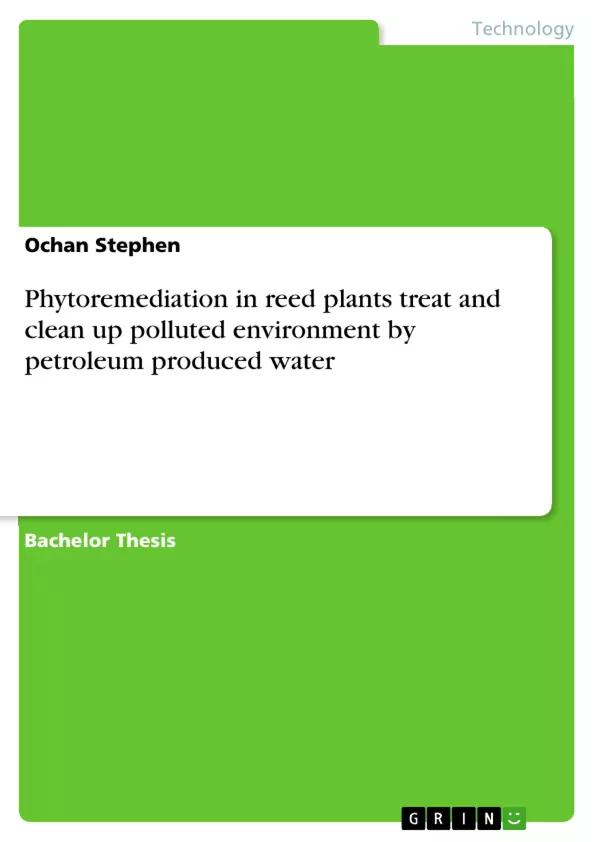Abstract.
Phytoremediation is the use of plants and its associated microorganisms to achieve the conditions necessary to facilitate the breakdown of contaminants and clean-up of the polluted environment. Phytoremediation technology is viewed as the simplest way of handling variety of contaminants in many sectors of oil industry.
The community of microorganisms in the rhizosphere has been shown to be involved in degradation of numerous contaminants, including pesticides, polynuclear aromatic hydrocarbons, petroleum compounds, volatile organic chemicals, and in organics. Also, plants can degrade contaminants during plant metabolic activities; for instance, 2,4,6-trinitrotoluene has been shown to be degraded by plant enzymes. Plants can use contaminants as nutrients; nitrate contamination of ground water can serve as a nitrogen source for plants.
This involves the achieving condition of ground water, waste oil and produced water from oil facilities.
Phytoremediation is recommended because of its establishment at low -cost and with flexibility in wide aspect of soil environmental remediation. Practical field experiments and laboratory water quality test analysis carried out in an oil field in TharJath-south Sudan by using reed species called Phragmites australis has shown promising results.
It is common perennial grasses that thrive best in wetlands and temperate tropical part of the world. Southern part of the Sudan being temperate and tropical region is suitable for this reed species to thrive well. This Thesis provides a real analytical test and report on the effective clean up of the polluted environment by the use of reed plants through phytoremediation process. Hence will encourage future studies on remediation of the contaminated soil.
Inhaltsverzeichnis (Table of Contents)
- Chapter 1: Introduction and background
- Research Hypothesis
- Study Area
- Reed beds establishment
- Parameters measurement and Frequency of the test analysis
- Chapter 2: Water quality and laboratory testing for Chemical Oxygen demand (COD) sample test
- pH, Temperature test and Biological Oxygen Demand (BOD)
- Sodium ions concentration (Na+) ions
- Chapter 3: Data analysis and presentation
- Monitoring and mentoring
- Chapter 4: Problems solving and presentations
- Conclusions of Research and significance of future plans
Zielsetzung und Themenschwerpunkte (Objectives and Key Themes)
This thesis aims to investigate the effectiveness of phytoremediation using reed plants (Phragmites australis) to clean up petroleum-produced water pollution in a South Sudanese oil field. The research focuses on practical field experiments and laboratory analysis to assess the remediation process.
- Effectiveness of phytoremediation using reed plants in cleaning petroleum-produced water.
- Water quality parameters before and after phytoremediation.
- Analysis of the role of microorganisms in the phytoremediation process.
- Assessment of the feasibility and cost-effectiveness of this remediation method.
- Recommendations for future research and application of phytoremediation.
Zusammenfassung der Kapitel (Chapter Summaries)
Chapter 1: Introduces phytoremediation and its application in the oil industry, stating the research hypothesis and detailing the study area and methodology. The establishment of the reed beds and the parameters measured are also described.
Chapter 2: Presents the results of laboratory water quality tests, including Chemical Oxygen Demand (COD), pH, temperature, Biological Oxygen Demand (BOD), and sodium ion concentration (Na+), before and after the implementation of the phytoremediation process.
Chapter 3: Details the data analysis and presentation of the findings from the water quality tests and field observations.
Chapter 4: Discusses problems encountered during the research and presents the findings.
Schlüsselwörter (Keywords)
Phytoremediation, reed plants (Phragmites australis), petroleum-produced water, water quality, Chemical Oxygen Demand (COD), Biological Oxygen Demand (BOD), South Sudan, oil field remediation, environmental cleanup, bioremediation.
Frequently Asked Questions
What is phytoremediation in the context of the oil industry?
Phytoremediation is a low-cost technology that uses plants and associated microorganisms to break down contaminants, such as petroleum compounds, in polluted environments.
How do reed plants (Phragmites australis) help clean up water?
Reed plants facilitate the degradation of pollutants through metabolic activities and by supporting a community of microorganisms in their rhizosphere that breaks down organic chemicals.
Where was the practical field experiment conducted?
The study was carried out in the TharJath oil field in South Sudan, a region where the temperate and tropical climate is suitable for reed species to thrive.
Which water quality parameters were tested in the study?
The research analyzed Chemical Oxygen Demand (COD), Biological Oxygen Demand (BOD), pH levels, temperature, and sodium ion concentration (Na+).
Why is phytoremediation recommended over other methods?
It is highly recommended due to its low establishment cost, flexibility in various soil environments, and its ability to handle a wide range of contaminants effectively.
- Quote paper
- Ochan Stephen (Author), 2011, Phytoremediation in reed plants treat and clean up polluted environment by petroleum produced water , Munich, GRIN Verlag, https://www.hausarbeiten.de/document/182962


